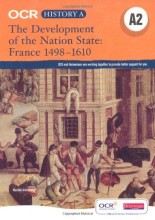Monarchy - Recovery of sorts under Henry IV and Sully (change)
38 important questions on Monarchy - Recovery of sorts under Henry IV and Sully (change)
What can said about HIV's recovery?
It was based on principles of traditional unity and control of the nobility = arguably the control of the 1st half of the 16th century - although because of the religious change, further conflict was inevitable.
Why was Henry IV's timing so important?
He would not have gotten the support of the middle ground if he abjured in 1589. In 1593, the league had no credible alternative & moderate Catholics desired peace and stability.
What can be argued about the extent of HIV's recovery and the situation in France?
It was not difficult to re-build France from where it was in 1594 (rock bottom in terms of socio-economic)
- Higher grades + faster learning
- Never study anything twice
- 100% sure, 100% understanding
What evidence is there to suggest that HIV gained power over the nobility?
In 1606, HIV travelled to Seden to deal with Bouillion, resulting 1000 nobles paying homage to him.
Why did moderate Catholics support HIV on his run up to becoming King?
Support for HIV was preferable over the Catholic league because it would keep Gallican independence from Rome.
Why was HIV's Arques 1589 victory so important?
Many provincial leaders of the league began to reject Mayenne's leadership (military leader of the league) while Pope Sixtus V became more receptive to the idea of HIV becoming King.
Why was Paris an obstacle for Henry of Navarre in his support to become king? How did he gain support from Paris?
Hi siege brought great hardship and death to the citizens of Paris between May and September 1590 = may unite Catholic opinion against him.
Henry of Navarre called off the siege = worked in his favour
Why was their no other suitable candidate other than Henry of Navarre for King?
Cardinal of Bourbon had died and Mayenne claimed the throne for himself; however, the league preferred his younger nephew Charles, Duke of Guise while others wanted the accession of PII of Spain to save the one true faith
= the extreme Catholic faction was disunited in their views over who should become King = Henry of Navarre emerged as the only reasonable claimant.
The Spanish ambassador proposed PII's daughter, Isabella to succeed the French throne; however, she was barred by the Salic Law which prevented women from ruling.
What did Henry of Navarre do in terms of bribery to gain support?
Henry of Navarre spent 30 million livres in bribes and often agreed to settle a town's debt of exempt it from tax as compensation for war = examples of his pragmatism
What policy did Henry IV take towards towns of the league when he got support to be King? What did he do to try and win over Leaguer towns and nobles?
He continued his policy of appeasement - a far cheaper and more attractive alternative to war. He also used bribes to win over Leaguer towns and nobles (which did not come cheaply)
What did HIV do in March 1594?
He entered Paris, with little resistance, and symbolically heard Mass at Notre Dame. (A week after his abjuration he visits every Pais Church and heard mass)
What did HIV do to reconcile with Rome in 1595? What did this mean he could do?
He reached an agreement with the Pope, Clement VIII promising to publish the decrees for the Council of Trent in return for absolutism = he could now turn his attention towards ridding France of the Spanish (declared war in 1595)
What aspect of HIV's character was shown in the Edict of Nantes 1598?
His pragmatism = Catholics and Protestants could live together in peace despite the fact that Protestantism had not been given full parity with Catholicism.
How did HIV feel towards the peasants' revolt?
He took a sympathetic line towards them = their debts were reduced
What was successful & unsuccessful about HIV's reign?
Successful - he demonstrated good kingship, was interested in welfare and enlightened toleration, restored unity
Unsuccessful - problems still existed regarding unification and centralisation by his assassination
- a huguenot minority still existed & fiscal pressures remained harsh on the 3rd Estate
- he mobilised troops 3 times between 1600 and 1610 = suggests if he wasn't assassinated he would have committed France to a costly war with Spain
What is HIV credited for in terms of rebuilding France after the FWOR?
- centralisation of gov & overriding provinical powers
- payment of debt & restoration of royal finances
- control of the nobility
- legitimate male heirs
- successful invasion of Savoy
- for once confessional antagonism took 2nd place to more pragmatic concerns
However, financial restraints & obstacles preventing centralisation still existed
What part of the war with Spain boosted HIV's prestige in 1595?
An immediate victory at Fontaine-Francaise
What did the Peace of Vervins state? When was it?
1598 - all towns captured by either side since Cateau Cambresis in 1559 should be returned = the treaty therefore returned Calais, Toul, Metz, Verdun and Amiens to France.
What was unfortunate about the Edict of Nantes and the Peace of Vervins?
Future discontent was inevitable
What can be said about HIV's attitudes towards peace and war during his reign?
HIV sought for peace because he had to, but in the long term he intended a more bellicose foreign policy.
What improvements did HIV and Sully achieve by 1608?
- over half debt was paid
- mortgages on crown property had been redeemed
- a large revenue had been accumulated in the treasury
- central administration had spread throughout the localities in a more systematic manner than before
- tax farming was better regulated
What was the immediate problem facing Sully in 1598?
The royal debt (300 million livres)
What reserve had Sully accumulated by 1610?
A revenue of 15 million livres
How much of the King's income was devoted to paying for the FWOR?
one-sixteenth in 1608
In what cases was debt from the FWOR not payed back?
- Swiss cantons only received one-seventh of the 36 million livres owed to them
- Internal debts and those owed to lesser German princes were often simply ignored and remained unpaid = resentment but little open hostility
What was the effect of Sully's economic policies on the third estate?
The total levy from the taille decreased from 18 million livres to an average of 15.8 million between 1600 - 1610 = relieved the burden on the Third estate slightly
What reflected a strengthened economy & centralisation after 1600?
- The yield from indirect taxes e.g. the gabelle
- permeate the localities with royal agents who maintained law and order while enforcing the king's will
Why was uniformity in tax collection impossible even during HIV's reign?
The popularity and power of provincial estates
What evidence shows that HIV and Sully attempted to unify tax assessment and collection? Why were reforms not applied to the whole kingdom?
They tried to erode the privileges of the pays d'etats - background-colorthey partly succeeded in Guyenne where 8 elections were established to administer the taille on behalf of the crown
background-color
Bitter opposition from other provinical estates meant reforms were not applied to the whole kingdom e.g. provinical estates in Dauphine, Burgundy, Provence & Languedoc were unwilling to pass tax collection over to tax officials and they were often supported by local nobles in their defence of parochial privilege.
When and what was the paulette? Why was this useful for the King?
1604 - allowed royal officials to ensure their heirs would continue to posses their offices in return for 1/60th of the capital value.
It created a predictable income from royal offices and removed offices from the patronage of leading nobles. It also ensured that venality took place on the crown's terms.
Asses the financial reforms under Sully/HIV. (5 points)
- under Sully, the royal budget achieved a surplus by 1610, standing at 15 million livres.
- Foreign debts were effectively liquidated through advantageous renegotiation, or, in the case of Tuscany, marriage
- Sully maintained a tight control on expenditure
- Centralisation improved the collection of tax, and while corruption and privileges were not eradicated they were turned to the advantage of the crown e.g. the paulette & the chambres de justice
- provincial estates remained virtually autonomous in tax collection
What can be said about the Biron & Bouillon rebellions?
They were over-ambitious and were never likely to succeed.
How many attempts were there to assassinate HIV during his reign? Who by?
More than twenty - mainly by extreme Catholics who doubted the sincerity of his conversion from Protestantism to Catholicism (his foreign alliances with the Dutch republic, England & the German princes convinced zealous Catholics that he was merely a lapsed heretic.
Who dominated the King's council by 1598?
The nobility of the Robe (with the exception of Sully)
When was the Chambres de Justice? What did it serve to do?
1601 - it along with the paulette were steps towards re-building monarchical authority.
What was contained in the royal brevets of the Edict of Nantes?
- toleration fo Huguenots - allowed to hold fortified towns
- salary of pastors were paid for by the state
What aspects of HIV's reign saw continuity from HIII's reign and what saw change?
- still has religious tension
- his death = italian regent and boy king
Change:
- no civil war
What did HIV's lit de justice serve to do?
Restore some centralisation
The question on the page originate from the summary of the following study material:
- A unique study and practice tool
- Never study anything twice again
- Get the grades you hope for
- 100% sure, 100% understanding
































